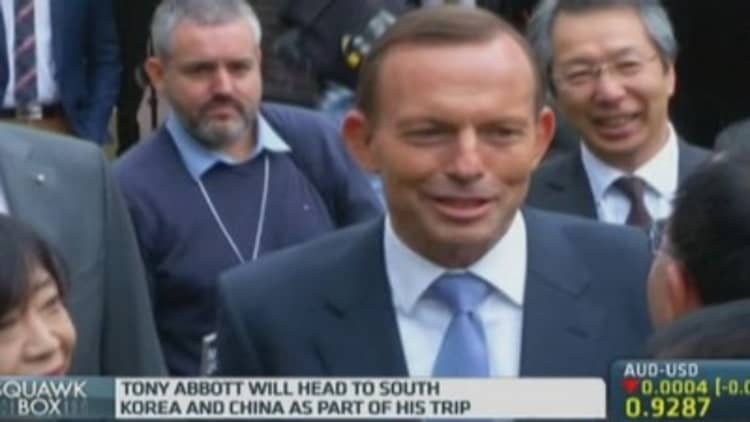
Japan and Australia will reach a trade deal on Monday, Japanese media said, spurring Tokyo's parallel talks with the United States as Pacific nations struggle for a broader agreement.
Australian Prime Minister Tony Abbott and his Japanese counterpart Shinzo Abe on Monday, will announce the basic bilateral agreement, featuring cuts to Tokyo's tariffs on imported beef and Canberra ending its duty on cars, the Nikkei, Asahi and Yomiuri newspapers reported.
Read MoreJapan's exports still not getting a weak-yen boost
While working on the economic partnership agreement with Australia, Japan is also in negotiations with the United States ahead of a visit late this month by President Barack Obama.
The two sets of bilateral talks are meant to help spur an overdue agreement on a broader Trans-Pacific Partnership trade pact.
Abbott had said on Sunday that he hoped for a quick conclusion to thorny free trade negotiations with Japan but suggested time might be needed to ensure conclusion of a "satisfactory" pact.
If Tokyo and Canberra agree, "Australia gets preferential treatment over the U.S., and America will be under pressure to strike a TPP deal short-term that puts it on a level playing field with Australia," said Aurelia George Mulgan, a professor of Japanese politics at the University of New South Wales.
Abbott, who has set a bilateral deal as a top priority, told the Asahi that Australia was prepared to make big concessions on cars and that cuts in Japan's beef tariffs would benefit Japan's consumers.
He said he hoped for an agreement in principle on Monday that could be formally signed when Abe visits Australia in July, the newspaper said.
Japan will agree to cut its tariffs on Australian beef below 30 percent from the current 38.5 percent and Australia will scrap its 5 percent duty on small and midsize Japanese cars, the reports said, citing unnamed sources.
Canberra has a lower hurdle on tariffs for Japanese cars after the Australian units of the country's three remaining carmakers - Toyota Motor Corp, General Motors Corp and Ford Motor Co - also decided to quit domestic production by 2017 due to high costs and a strong currency.
U.S. Trade Representative Michael Froman will travel to Japan on Monday, his office said on Saturday, in a bid to break a bilateral stalemate bogging down the 12-nation TPP talks.
Washington and Tokyo are each urging the other to be more flexible on the sticking points of access to Japan's farm and car markets and U.S. tariffs on imported cars and trucks.
The TPP, which Japan joined last year, is a centerpiece of Obama's push to expand the U.S. presence in Asia. The talks have entered their fifth year. The Japanese and U.S. economies dominate the grouping, which encompasses one-third of global imports and exports.
Froman told a congressional panel last week that "it's time for Japan to step up to the plate," while Japan's deputy chief trade negotiator Hiroshi Oe said recently that "in order to make a breakthrough, the United States has to show flexibility."
The United States wants Japan to open its rice, beef and pork, dairy and sugar sectors - areas Abe has vowed to defend. Japan wants a timetable on U.S. promises to drop tariffs of 2.5 percent on imports of passenger cars and 25 percent on light trucks.
Advocates say the TPP could accelerate global economic growth, boost U.S. exports and level the playing field between emerging and rich nations in one of the world's biggest trade pacts.
The TPP talks, including Canada, Mexico, New Zealand, Malaysia and others, missed a deadline for an agreement by the end of last year.

